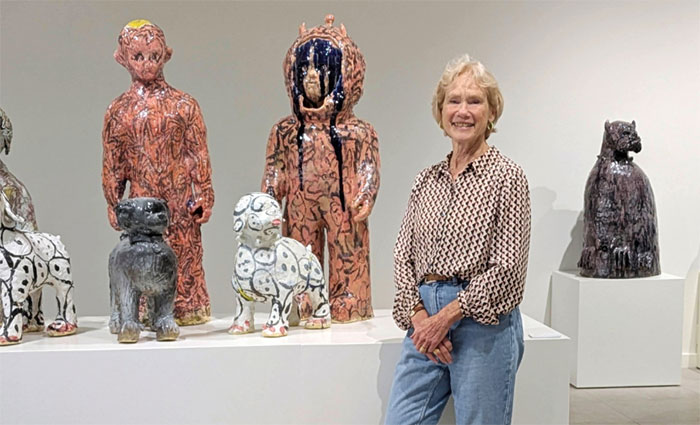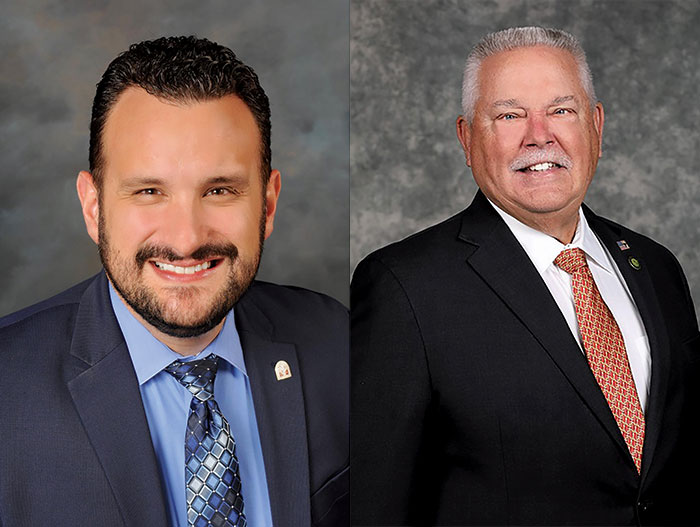Claremont-based group under scrutiny for frequent protests
Just last Tuesday, the Department of Justice moved to discipline sanctuary cities for not complying with certain Immigration and Customs Enforcement efforts to apprehend undocumented immigrants. The punishment is withdrawal of federally-funded Byrne Memorial Justice Assistance grants, which provide hundreds of millions of dollars to local law enforcement.
The sanctuary city debate became a flashpoint at a January 24, 2017 city council meeting regarding a resolution reaffirming Claremont’s commitment to diversity and safeguarding the civil rights, safety and dignity of all people.
During this meeting, one group—We the People Rising—was particularly vocal in its opposition to undocumented immigration and sanctuary cities. This was the group’s most notable recent demonstration in Claremont.
However, the Claremont-based group and its members have gained regional and national attention for their frequent, often-heated protests, and the Southern Poverty Law Center has listed the group on its annual list of “nativist extremist” organizations since 2014.
We the People Rising was founded in 2011 and 2012 when its executive director, Robin Hvidston and others organized at the offices of former Congressman Gary Miller in Rancho Cucamonga to support enforcement of immigration laws.
“Unions and different organizations protested at his office very frequently. A group of us started going and counter-protesting in support of enforcing immigration laws,” Ms. Hvidston said.
Since then, We the People Rising has organized protests throughout Southern California—and, occasionally, the country—in favor of strict enforcement of immigration laws, Ms. Hvidston added.
Ms. Hvidston has been involved with a variety of anti-undocumented immigration groups, including the Minutemen Project—a national group that patrolled the border and which, in 2005, President George W. Bush characterized as “vigilantes”—and We the People California’s Crusader, a defunct Southern California anti-undocumented immigration group whose leader, Raymond Herrera, surveilled day laborers.
Ms. Hvidston is also the California coordinator for the Remembrance Project, which highlights stories of people killed by undocumented immigrants.
Ms. Hvidston and We the People Rising oppose undocumented immigration because they believe it diverts government resources from needy Americans.
“We don’t think it’s fair to American citizens that are in need of help, that are neglected, that don’t even compete in a lot of instances because those here illegally get preferences in government funding or assistance,” she said.
She further believes that the United States’ legal immigration provisions are lenient enough.
“We are a very generous nation. We process more than 1.5 million [immigrants] every year. I just think our country should be thanked for that, and we should get proper accolades for our legal immigration process,” she said.
Law-breaking and violence by undocumented immigrants are another focus for Ms. Hvidston and We the People Rising.
“If people are here illegally and committing crimes, that is the issue,” she said. “If a person who is here illegally commits a crime was not here, that would be less crime in our country.”
Despite this focus on undocumented immigrants’ crimes, statistics indicate that immigrants, both documented and undocumented, commit less crime than US citizens.
The SPLC describes nativist extremist organizations, including We the People Rising, as “organizations that go beyond mere advocacy to personally confront suspected undocumented immigrants or those who hire them,” according to the SPLC website.
Ms. Hvidston disputed the SPLC’s characterization. She said that We the People Rising’s protests target local, state and federal governments and elected officials, not private individuals.
“Our official focus is the government, period. Interactions with individuals should not be going forward,” she said.
We the People Rising’s participation in a July 2014 protest of an Immigration and Customs Enforcement bus convoy bringing undocumented detainees to a Border Patrol facility in Murrieta, California was a primary reason it was included on the nativist extremist list, said Ryan Lenz, the Senior Investigative Reporter for the SPLC Intelligence Report and the Hatewatch project.
During the protest, which involved 200 to 300 people from a variety of groups, protesters blocked the buses from reaching the facility and forced them to reroute to a facility in San Diego.
“They forced a bus full of children who had escaped violence in South America out of town,” Mr. Lenz said.
Ms. Hvidston said that she participated in the Murietta protest because she did not believe that Murietta Border Patrol facility was equipped to process the large number of detainees in the convoy
“I did not think this was a humane program for those here illegally. The facility was not set up to do this type of process,” she said.
We the People Rising’s protests have become more numerous and frequent as issues surrounding undocumented immigrants, including sanctuary city proposals, have claimed the political spotlight.
“It has been increasingly active over the past year. These days, they schedule protests weekly and they are really known for their confrontational and aggressive style, which has caused problems for them and for the elected officials that they have confronted and harassed,” Lindsay Schubiner, the Advocacy Director for the Center for New Community (CNC), said.
CNC is a national research and advocacy organization that opposes groups promoting bigotry. Mr. Lenz described Ms. Schubiner as a leading expert on We the People Rising.
Richard Vargas, a member of the Defend Movement, which frequently counter-protests We the People Rising, corroborated Ms. Schubiner’s description of We the People Rising’s rhetoric.
“They’re usually really agitated and they come at us. They come usually to town hall meetings to disrupt, never to really get any real point across. They just say they’re pro-Trump and pro-American,” he said.
Although We the People Rising’s mailing address is in Claremont, Ms. Hvidston is an Upland resident, and the group has not been very active locally. Its most recent action in Claremont was at the January 24 council meeting.
At the meeting, Ms. Hvidston and two other members of We the People Rising, neither of them from Claremont, decried the possibility of making Claremont a sanctuary city, even though such a proposal was not in consideration at the meeting.
“We wanted to be there to voice our opposition to making Claremont a sanctuary city because we knew individuals that evening wanted to propose making Claremont a sanctuary city,” she said.
The COURIER reached out to Arthur Schaper—a Torrance resident who spoke at the council meeting as a member of We the People Rising—for comment on his statement at the meeting. In response, Mr. Schaper posted twice on his blog criticizing the COURIER and its staff members.
While We the People Rising’s protests focus on undocumented immigration, the organization’s ultimate goals are much broader, Ms. Schubiner and Mr. Lenz said.
“If you look at the kind of racist language that they’re using at their demonstrations, it’s clear who they’re targeting and that it is broader than undocumented immigrants,” Ms. Schubiner said.
Mr. Lenz expanded on Ms. Schubiner’s assertions.
“This is an organization that works to ensure, through vicious attacks on immigration laws, that this is a predominantly white country. They feel that immigration and the country’s immigration policies have introduced higher levels of crime because Mexicans are prone to criminality,” he said.
Ms. Hvidston strongly denied accusations that We the People Rising has racist intentions.
“The color of our skin is American,” she said. “I don’t see why skin color is even an issue in this debate.”
According to Mr. Vargas, however, We the People Rising members have used racist language directed at Latinos and African Americans at their protests.
Ms. Hvidston re-emphasized her concerns about crime by undocumented immigrants and said that questions of inherent criminal tendencies are not the issue.
She repeated her desire to see current immigration laws enforced more strictly and blamed former President Barack Obama for the United States’ failure to enact comprehensive immigration reforms.
—Marc Rod
marcrod1297@gmail.com








0 Comments